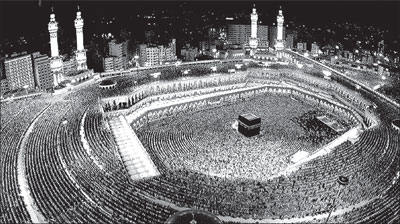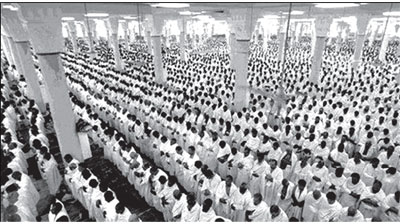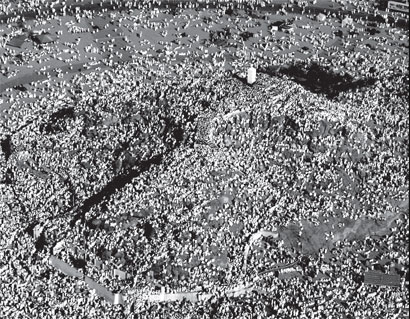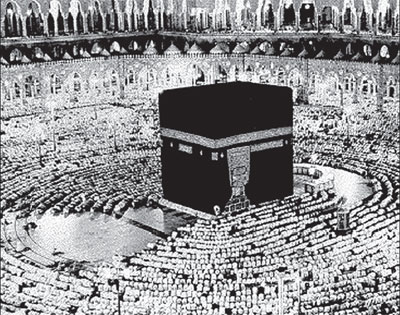|
ISLAM |
Compiled by Latheef Farook |
Hajj - symbol of universal brotherhood and peace
Dr. JAVED JAMIL
Islam, literally meaning peace and defined as total submission to One
God, stands on five pillars. Faith and prayer are primarily meant to
ensure physical, mental, social and spiritual peace of individuals.
Fasting and Zakah are aimed, in addition, at social and national peace.
With Hajj, the system of peace assumes global dimensions.
The annual pilgrimage to Mecca, the birth city of Muhammad (peace and
blessings of Allah be with him) and the seat of Kabah, the first place
of the worship of God on earth, is a reminder to the world that Islam’s
mission of peace has global aims. And it is a reminder to Muslims that
they must earnestly endeavor in that direction. It disseminates the
message of universal brotherhood and equality irrespective of race,
colour and creed not only among Muslims but also among the rest of
mankind.
Pilgrimages are popular in many religious communities, but the
pilgrimage of Islam has a very special significance.
|

Hajj pilgrims at the Holy Mosque in Mecca |
1. It is associated with the first place of worship on earth, which
serves as a symbol of monotheism, giving this a special historical and
evolutionary significance. The symbolization is of paramount importance.
This being the greatest symbol of the unity of God also becomes the
greatest symbol of the unity of mankind. It is reminded that since the
beginning of human history man has been told to worship only one God. If
certain sections of the human race have chosen to dilute monotheism, in
one way or the other, it is their own error of judgment. The unity of
mankind cannot be a practical reality unless the whole of mankind
submits to one system. Only a system of God can be the rallying point
for them.
The historical significance of the place linking it to Adam, the
forefather of all human beings and Abraham, the Patriarch of all Semitic
religions including Judaism, Christianity and Islam is indisputable.
This refreshes in the minds of Muslims their relationship to the whole
mankind and their very special relationship to Jews and Christians. Thus
Muslims extend an olive branch to the whole mankind especially to Jews
and Christians conveying to them that they have common historical,
spiritual and biological roots.
2. It is a comprehensive, highly systematic and perfectly coordinated
exercise having spiritual, collective, socio-economic and global
dimensions. Pilgrims understand that this is a lifetime opportunity to
seek God’s forgiveness for their sins, enhance their proximity to their
Guardian and mend their ways. They sacrifice their time, their money,
their emotional attachment to their near and dear ones and their
physical comforts for the pleasure of God. Their total involvement in
spiritually elevating rituals for several weeks goes a long way to make
them better human beings; a person who has performed Hajj has an
increased credibility in the eyes of the people.
3. People from all over the world gather at Mecca not only to pay
obeisance to Allah but also to listen to the sermon of Imam, who has an
unparalleled opportunity to bring home Islam’s message of universal
brotherhood, equality, justice, peace, to call for unity against the
forces of evils, destabilization, oppression and exploitation and to
emphasize the role of God’s system in world affairs. All pilgrims adorn
the same cloth, join prayers together without any discrimination and
invoke God collectively. This provides a unique spectacle of equality
and brotherhood and determination to fight against evils.
4. Visits to various places of historical importance at Mecca and
Medina rekindle revolutionary fervour in hearts, minds and souls of
pilgrims. They recollect the huge sufferings of Prophet Muhammad (peace
and blessings of Allah be with him) and his followers in the face of the
severest kind of persecution and hostility, their unflinching faith in
God, their unshakeable determination and their ultimate triumph. When
they return home, normally they are much transformed persons; most of
them if not all demonstrate visible changes in their attitude towards
themselves and the people around themselves. They are less likely to
reach the same level of vices they had touched before they had embarked
upon the pilgrimage. Many of them lead a truly pious life throughout the
rest of their life.
|

Hajj pilgrims at prayer at Prophet’s Mosque in Madina |
It is unfortunate that the Khutba delivered to the mankind through
the people gathered at Arafat is usually not a true sample of sermon
describing the true aims of Islam in general and Hajj in particular. It
merely calls for purification of individuals and is usually silent on
the current state of the social, economic, political and moral state of
world affairs. I know there can be differences of opinion regarding
political issues and the Khutba delivered at Mecca cannot be expected to
say anything that differs with the policies of Saudi government, still
there are issues that can be raised without inviting the ire of Saudi
authorities.
The Khutba must include the following:
1. A call to mankind to unite for establishing peace. It must be told
that peace is not mere absence of conflicts but comprises peace at the
individual, family, social, national and international levels in this
world and peace in the Hereafter;
2. Protest against the glorification and commercialization of evils
like alcohol, gambling, promiscuity, prostitution, pornography, smoking
and drugs and call to declare them as “Fundamental Prohibitions” for the
whole world;
3. Show of concern towards the rise in crimes all over the world
particularly murders and rapes;
4. Show of concern on the disintegration of family system;
5. Special attention to the killing of human foetoses in the name of
freedom of choice;
5. Show of extraordinary concern towards the increasing economic
disparity and the plight of the poor especially in African, South
American and Asian countries; and the need to revise the whole economic
model;
6. Protest against the killing of innocents whether by terrorists or
in the name of “fight against terrorism”. This can be difficult for the
Saudi Imam to do but he can use indirect references to carry out the
message without naming the countries or persons.
7. Last but not the least, it should bring home the Islamic
philosophy of the unity of mankind. It should also stress the need of
all the religions and like minded groups in the efforts to unite for
common aims.
A committee can alternatively be formed which can discuss in advance
the contents of a written Khutba.
The Prophet’s good name - some issues
Abu Haneefa Sohail
For Muslims, he is the Messenger of God. The final Prophet sent to
mankind to complete the legacy of Abraham, Moses and Jesus. He was known
by his community prior to Prophet-hood as ‘Al-Amin’ (The Trustworthy).
And at the age of 40 he was visited by the Angel Gabriel who revealed
the very first verse of the Quran, “Read in the name of your Lord, who
creates”.
This remarkable journey continued for another 23 years until the
Prophet Muhammad discharged the responsibility entrusted upon him of
conveying the final revelation.
“If I was sure I would be faithful to him, I might hope to meet him,
and if I were with him, I would wash his feet.” - Heraclius, Emperor of
the Byzantine Empire
The Prophet Muhammad stands alone as the most remarkable and
influential figure in human history. He was described by Michael Hart in
his ‘The 100, a Ranking of the Most Influential Persons in History’ as
“supremely successful” in both the religious and secular realms. He
spent his nights weeping to God and standing in solemn prayer until his
feet swelled; He was the military commander who fought 19 battles,
unifying the tribes of the Arabian Peninsula, shaking the foundations of
the Byzantine Empire and demolishing the Persian Empire.
He was the diplomat who negotiated treaties with Heads of State,
never breaching his word or compromising his integrity. He was the head
of state who transformed the marauding Bedouin Arabs into a
sophisticated, well-organized and just society. He was the loving
grandfather, devoted to his children and grandchildren, remaining in
prostration for extended periods until his grandchildren finished
playing on his back. He was the loving husband who described his wife
Aisha as the most beloved person to him, treating her with the affection
and romance of a true gentleman, breathing his last breath while resting
in her arms. He was the quintessence of human perfection and refined
character. He was the leader who stands tall above all other leaders.
Late in the 19th year of Prophet-hood, on his return from signing the
Treaty of Hudaibiyah that guaranteed peace between the early Muslims and
the pagans of the Arabian Peninsula, the Prophet Muhammad sent letters
to the kings beyond Arabia calling them to Islam. In order to
authenticate the credentials of his envoys, a silver seal was made in
which were graven the words, “Muhammad the Messenger of Allah.”
The manner in which two of these letters were received reveals much
of the mindset of their respective civilizations, but more importantly,
they provide an insight into the final end of those who ridicule or
insult the Prophets of God. The first of these letters was sent to
Heraclius, King of the Byzantine Empire, also known as the eastern Roman
Empire with its capital in Constantinople. It simply read:
“In the name of Allah, the Most Beneficent, the Most Merciful. From
Muhammad, the slave of Allah and His Messenger to Hercules, King of the
Romans. Blessed are those who follow true guidance. I invite you to
embrace Islam so that you may live in security. If you come within the
fold of Islam, Allah will give you a double reward, but in case you turn
your back upon it, then the burden of the sins of all your people shall
fall on your shoulders”.
The response of Heraclius was completely consistent with an empirical
rational approach that was to become the forte of progressive western
societies. He investigated, questioned and then arrived at an
evidence-based conclusion free of bias. He summoned Abu Sufyan, who was
the chief of the pagan Arabs and an adversary of the Prophet Muhammad,
and placed behind him his companions, instructing them to contradict Abu
Sufyan if he spoke a lie. Heraclius then proceeded to interrogate him
regarding this man who claimed Prophet-hood. Abu Sufyan answered as
follows:
“Muhammad descends from a noble family. No one from his family has
ever assumed kingship. His followers are those deemed weak with numbers
ever growing. He neither tells lies nor betrays others, we fight him and
he fights us but with alternate victory. He bids people to worship Allah
Alone with no associate, and abandon our fathers’ beliefs. He orders us
to observe prayer, honesty, and abstinence and maintain strong family
ties.”
The response of Heraclius reveals a leader who was endowed with some
wisdom and understanding and knew too well the lofty status of the
Prophets of God. He neither mocked the call of the Prophet Muhammad, nor
accepted it blindly but verified his claim:
“I fully realize that Prophets come from noble families; he does not
affect any previous example of Prophet-hood. Since none of his ancestors
was a monarch, we cannot then allege that he is a man trying to reclaim
his father’s monarchy. So long as he does not tell lies to people, he is
for the more reason, immune to telling lies as regards Allah. Concerning
his followers being those deemed weak with numbers ever growing, it is
something that goes in agreement with questions of Faith until this
latter assumes its full dimensions amongst all places and all peoples.
“I have understood that no instance of apostasy has as yet appeared
among his followers and this points to the bliss of faith that finds its
abode in the human heart. Betrayal, as I see, is alien to him because
real Prophets hold betrayal in abhorrence. Bidding worship of Allah with
no associates, observance of prayer, honesty and abstinence and
prohibition of paganism are traits bound to subject to him all my
possessions. I have already known that a Prophet must arise but it has
never occurred to me that he will be an Arab from among you. If I was
sure I would be faithful to him, I might hope to meet him, and if I were
with him, I would wash his feet.’ Despite the fact that the Byzantine
Empire remained at war with the Muslims, their armies frequently meeting
on the battlefield, the respect and honour afforded to the Prophet
Muhammad by Heraclius set a precedent that was to be observed by future
generations of Byzantine monarchs.
The 12th century Muslim historian, al-Suhayli, reports that Heraclius
ordered the letter of the Prophet Muhammad be preserved in a golden
tube. It was venerated by successive generations of monarchs until it
reached the monarchs that conquered Toledo in central Spain. Abdul Malik
ibn Sa’d, a commander of the Muslim armies in Spain narrates that a
Christian king brought forth the letter from a golden tube and
identified it as the letter of the Prophet Muhammad. Abdul Malik wept
and asked permission to kiss the letter but permission was not granted.
Being a people of Christian faith, endowed with knowledge of the
Gospels they fully recognized the Prophethood of Muhammad. More
importantly they understood that venerating the signs of this Prophet
such as his letter, was a sure means of preserving their kingdom.
The second of these letters was sent to Chosroes, Emperor of the
Persian Empire. It stated simply: “In the Name of Allah, the Most
Beneficent, and the Most Merciful. From Muhammad, the Messenger of Allah
to Chosroes, King of Persia. Peace be upon one who follows true
guidance, believes in Allah and His Messenger and testifies that there
is no god but Allah Alone with no associate, and that Muhammad is His
slave and Messenger.
To be continued
Remembering the farewell sermon of the Prophet
Muhammad (peace be upon him) gave at Mount Arafat during the only Haj
he performed in 10H, which is also known as the Farewell Sermon, is a
good reminder for us today as only few days remain for the 1433H Haj:
“O People, lend me an attentive ear, for I don’t know whether, after
this year, I shall ever be amongst you again. Therefore listen to what I
am saying to you carefully and take these words to those who could not
be present here today.
“O people, just as you regard this month, this day, and this city as
Sacred, so regard the life and property of every Muslim as a sacred
trust. Return the goods entrusted to you to their rightful owners. Hurt
no one so that no one may hurt you. Remember that you will indeed meet
your Lord, and that He will indeed reckon your deeds. Allah has
forbidden you to take Riba (interest), therefore all interest
obligations shall henceforth be waived.
|

Mount Arafa from where the Prophet (PBU H) made the last sermon |
Beware of Satan, for the safety of your religion. He has lost all
hope that he will ever be able to lead you astray in big things, so
beware of following him in small things.
“O people, it is true that you have certain rights with regard to
your women, but they also have right over you. If they fulfill your
right then to them belongs the right to be fed and clothed in kindness.
Do treat your women well and be kind to them for they are your partners
and committed helpers. And it is your right that they do not make
friends with any one of whom you do not approve, as well as never to
commit adultery.
“O people, listen to me in earnest, worship Allah (alone), establish
your five daily prayers (Salah), fast during the month of Ramadan, give
your wealth in Zakat, and perform Hajj if you can afford to. You know
that every Muslim is the brother of another Muslim. You are all equal.
Nobody has superiority over other except through piety and good action.
Remember, one day you will appear before Allah and answer for your
deeds. So beware, do not astray from the path of righteousness after I
am gone.
“O people, no prophet or apostle will come after me and no new faith
will be born. I leave behind me two things, the Quran and the Sunnah, if
you follow these you will never go astray.
“All those who listen to me shall pass on my words to others and
those to others again; and may the latter understand my words better
than those who listen to me directly.”
Be my witness O Allah that I have conveyed Your message to your
slaves.
Permission is granted to circulate among private individuals and
groups, to post on Internet sites and to publish in full text and
subject title in not-for-profit publications.
Kabah - Holy House of Allah:
The Kabah - what is it really?
With only a few days for the annual Hajj pilgrimage, one of the five
principal requirements or pillars of Islam is that millions of Muslims
from all corners of the world start arriving in the Holy city of Mecca.
|

Pilgrims praying at the Haram mosque in Makkah. In this mosque
is the
Kaaba (the black building in the picture) which Muslims turn
toward
when praying. The Kaaba is the place of worship which God
commanded
the Prophets Abraham and his son, Ishmael to build |
What is strange is that this insignificant structure is the center of
Hajj rites and the direction of our prayers. Pilgrims circle the Kaaba
and attempt to kiss a small black stone known as Hajar Al Aswat.
Kabah may not rival skyscrapers in height or mansions in width, but
its impact on history and human beings is unmatched. Located at the
centre of Masjid al Haram, the largest Mosque in the Holy City of Mecca
is the building towards which Muslims face five times a day in their
daily prayers.
Why is this tiny stone cubic house so important? The Kaaba has great
cosmological significance that is the physical correspondence of the
highest heaven. The Kaaba is called the House of God. But we know God
needs no house and is not confined to any space.
It is also called the first house of mankind. Yet no human is known
to have ever lived in it, so what does that mean?
The Sacred Mosque in Makkah, is the first House of worship appointed
for mankind. Along with this appointment, Allah blessed this sacred
place with many signs of distinction. Allah says: “Verily, the first
House (of worship) appointed for mankind was that at Bakkah (Mecca),
full of blessing and guidance for the mankind and jin. In it are
manifest signs (for example), the place of Ibraaheem; whosoever enters
it, he attains security...” (Quran 3:96-97). |





